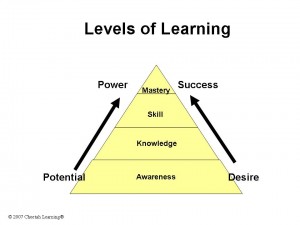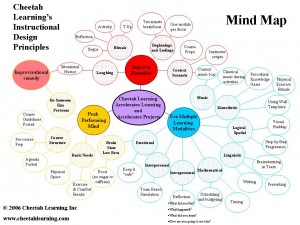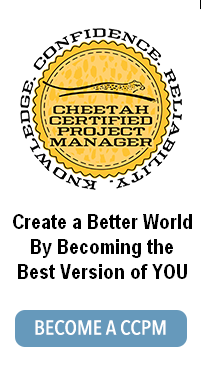What is Accelerated Learning?
Wednesday, November 12th, 2008Being in the field of “accelerating” learning, I hear this question quite often. Accelerated Learning is just making it faster and easier to learn and master new skills. Learning has four basic components:
Awareness – people first become aware of what it is they don’t know. Just becoming aware of not knowing something isn’t enough to drive desire to learn more though. When combined with “purpose” – that is a reason to learn more, then people develop the desire to learn more about the topic.
Knowledge – this is where people accumulate facts about the specific topic. Knowledge of a subject is exhibited by the ability to recall facts and to synthesize the information in the area sufficiently to answer test questions on the subject, and to communicate about the subject.
Skill – this is where people can use what they know to accomplish a specific task.
Mastery – this is where people can achieve consistent results with their skills. Mastery is where power and success come with learning new material.
So Accelerated Learning in the way I’ve developed courses for Cheetah Learning means getting people to a level of mastery in the subject area very quickly.
I first became aware of the concept of Accelerated Learning in the early 90’s. By 2000, I had developed mastery in creating accelerated learning curricula. In 1998 I was a research scientist and started testing out some ideas on how to teach people project management in a way that they would develop mastery in doing the fundamentals of project management in one day. This means that they would be able to leave the class and the next day be able to achieve consistent results with their new project management skills. This became the basis of the Cheetah Project Management technique.
There are three fundamental components of creating accelerated learning courses so that people are able to master new skills faster:
1. Put the mind in a peak performing state.
2. Engage multiple forms of intelligence.
3. Set up the experience so that it makes it easy to recall and retain the new knowledge and become proficient in the new skills.
If you’d like to learn more, I discuss the topic of how we create our accelerated learning curricula on the radio show Power Learning co-hosted with Scot Nichols, the Executive Director of the Center for Advanced Learning Concepts.



